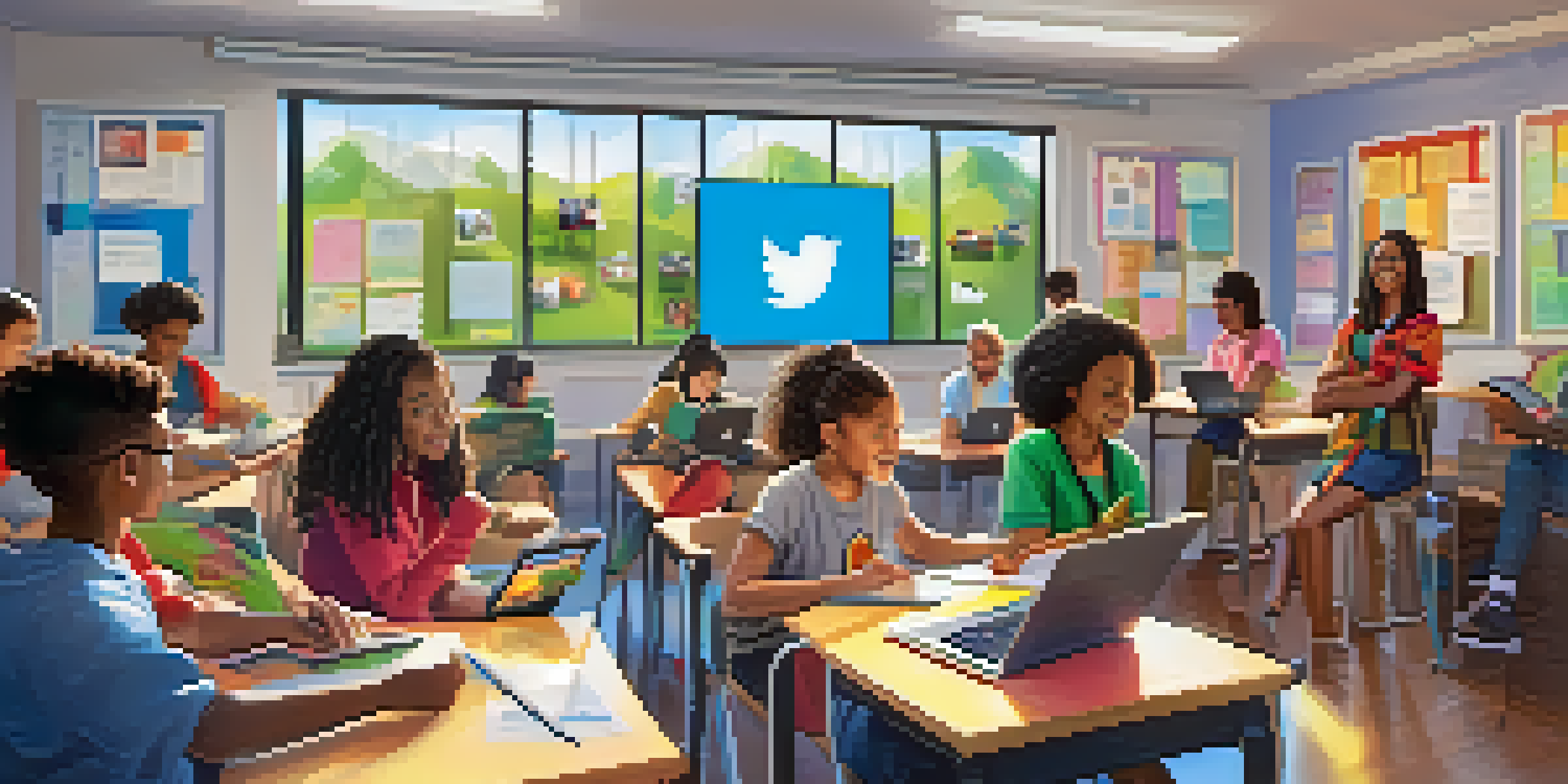Social Media Campaigns for Educational Awareness and Initiatives

Understanding the Power of Social Media in Education
Social media has transformed the way we communicate, making it a vital tool for educational initiatives. With billions of users worldwide, platforms like Facebook, Instagram, and Twitter offer unique opportunities to reach diverse audiences. For educational campaigns, these platforms can spread awareness, foster community engagement, and inspire action.
Education is the most powerful weapon which you can use to change the world.
Think of social media as a digital megaphone; when used effectively, it amplifies your message far and wide. For instance, a simple post can connect educators with students, parents, and even policymakers. This connectivity is crucial for campaigns aimed at raising awareness about important educational issues.
Moreover, the visual nature of social media allows for creative storytelling. By sharing videos, infographics, and images, campaigns can convey complex ideas in an easily digestible format, making education more accessible and engaging for everyone.
Identifying Your Target Audience for Effective Campaigns
Before launching a social media campaign, it's essential to identify who you want to reach. Understanding your target audience helps tailor your message and choose the right platforms for engagement. For example, younger audiences may be more active on TikTok, while educators and parents might prefer Facebook.

Using audience insights and analytics tools can provide valuable information about your potential followers. Consider their interests, demographics, and online behavior to craft messages that resonate. This targeted approach ensures that your educational initiatives are seen by those who matter most.
Leverage Social Media for Education
Social media acts as a powerful tool to spread awareness and engage diverse audiences in educational initiatives.
Once you have a clear picture of your audience, you can create content that speaks directly to them. By addressing their specific needs and concerns, your campaign will not only capture attention but also inspire meaningful interactions and discussions around your educational topics.
Creating Compelling Content that Educates and Engages
Content is king in the realm of social media, and for educational campaigns, compelling content is crucial. Start by focusing on creating informative and engaging posts that provide value to your audience. This could be in the form of how-to guides, educational videos, or thought-provoking questions that encourage discussion.
The beautiful thing about learning is that no one can take it away from you.
For example, a campaign focused on environmental education could share tips on sustainability practices alongside stunning visuals of nature. This not only educates the audience but also inspires them to take action. Remember, impactful content often combines education with emotion, making it more likely to be shared.
Additionally, leveraging storytelling can humanize your campaign. Sharing real-life stories of students, teachers, or community members impacted by educational initiatives can create a deeper connection with your audience. When people can relate to the content, they are more likely to engage and share it.
Utilizing Influencers to Amplify Your Message
Influencer marketing is a powerful strategy in social media campaigns, especially for educational initiatives. Collaborating with influencers who align with your campaign's values can help you reach a broader audience. These individuals often have established trust and credibility with their followers, making their endorsements more impactful.
For example, partnering with a popular educator or a student advocate can lend authenticity to your campaign. They can share your message in a way that resonates with their audience, potentially driving more engagement and participation in your initiative. This approach not only expands reach but also creates a sense of community around your cause.
Know Your Audience for Success
Identifying your target audience allows for tailored messaging and effective engagement on the right platforms.
When selecting influencers, ensure they genuinely support your educational mission. Authenticity is key; audiences can quickly spot insincerity. By working with influencers who are passionate about your cause, you can create a more cohesive and compelling narrative for your campaign.
Engaging Your Audience through Interactive Content
Interactive content is a fantastic way to engage your audience and make your educational campaign memorable. Quizzes, polls, and challenges invite participation, allowing users to interact with your message actively. This not only fosters engagement but also deepens their understanding of the subject matter.
For instance, a quiz on historical facts related to a campaign could spark interest and encourage users to share their results. This engagement can lead to organic discussions and sharing, further amplifying your campaign's reach. Plus, interactive content often leads to higher retention rates, meaning your message sticks longer with your audience.
Additionally, incorporating user-generated content can enhance community involvement. Encourage your audience to share their experiences related to your campaign topic. This not only boosts engagement but also creates a sense of ownership and pride among participants.
Measuring Success: Key Metrics to Track
Once your campaign is underway, measuring its success is crucial to understanding its impact. Various metrics can help you gauge engagement, reach, and overall effectiveness. Common metrics include likes, shares, comments, and click-through rates, which provide insight into how well your content resonates with your audience.
For educational campaigns, consider tracking specific goals, such as increased awareness of a particular issue or improved community engagement. Tools like Google Analytics and social media insights can offer valuable data to assess your campaign's performance. Analyzing this data allows you to make informed adjustments to your strategy.
Create Engaging, Interactive Content
Compelling and interactive content fosters deeper connections and encourages active participation in educational campaigns.
It's important to remember that success isn’t always measured by immediate results. Sometimes, the goal is to foster long-term awareness and change. By regularly reviewing your metrics, you can identify trends over time and adapt your approach to achieve your educational objectives effectively.
Building a Community for Lasting Impact
Creating a successful social media campaign goes beyond short-term goals; it’s about building a community around your educational initiative. Encourage dialogue among your followers by responding to comments and fostering discussions. This interaction not only enhances engagement but also helps build trust and loyalty.
Consider creating dedicated groups or forums where your audience can share ideas, resources, and experiences related to your campaign. These spaces can serve as platforms for ongoing education and collaboration, making your initiative more impactful over time. For example, a Facebook group focused on literacy could provide a space for parents, educators, and advocates to share tips and support each other.

Ultimately, a strong community can amplify your campaign's reach and effectiveness. When people feel connected to a cause, they are more likely to advocate for it, share it, and participate in future initiatives. This sense of belonging can lead to lasting change and a deeper commitment to educational issues.